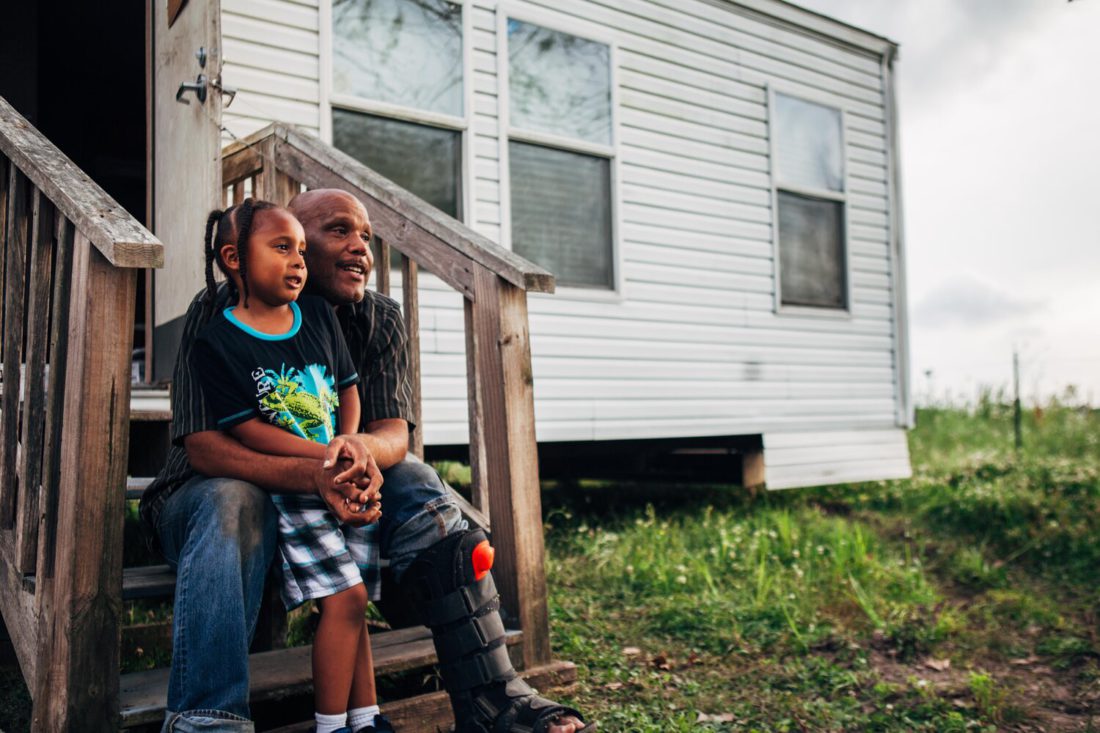Small towns struck by environmental contamination have been the focal point of numerous documentaries, yet in Mossville: When Great Trees Fall, director Alexander Glustrom manages to frame this familiar subject in novel ways.
Within the U.S., fenceline communities — those directly adjacent to facilities that significantly impact residents’ daily health — are disproportionately inhabited by people of color and the working poor. Mossville, La., is one such town with very few citizens remaining, and its rich history — which includes being founded by freed and former slaves in the late 18th century — is about to be wiped from physical memory.
At the center of Glustrom’s documentary is Stacey Ryan, the last remaining resident of downtown Mossville. The film follows Ryan’s stalwart stand as he refuses to sell out his small, paid-off trailer home to Sasol, a South Africa-based chemical company that has already established a foothold in the area with a large industrial plant. As soon as the filmmaker shines a light on Sasol’s apartheid-era legacy in South Africa, the parallels with Mossville are clear.
While the core conflict is sufficiently compelling, Mossville mines deeper emotions by weaving the cinematography and soundtrack together to stress the poetic tragedy of Ryan’s last stand. The razed landscape surrounding the Sasol compound and adjacent to Ryan’s home presents an eerie, otherworldly scene that’s devastating to behold. Aerial shots that zoom back from Ryan’s home are absolutely gripping, driving the point home that this once-vibrant and proud community is now hell on Earth. The accompanying music oscillates from dark, ethereal droning synths during the blown-out landscape scenes, to soulful, simple spirituals while Ryan’s humble ax keeps the beat with each swing as he toils on his small plot of land, drawing parallels to chain gangs from a bygone era.
Despite these strengths, Mossville falls a bit short of fully explaining why it’s so difficult for Ryan to leave his lifelong home. Watching his health decline while he struggles to survive without electricity or running water, the viewer is likely to start wishing Ryan would just sell to Sasol and get the heck out of there — if not for his own well-being, then for the sake of his young son, who lives with Ryan’s ex-partner. Rather than spell out the reasons for Ryan’s stubbornness, Glustrom keeps the motivations somewhat frustratingly vague, dropping hints regarding environmental racism and Ryan’s determination to enjoy a life that was denied to many of his ancestors.
The lack of answers may well keep the film from reaching the wide audience it deserves, and the same goes for its lack of solutions to counteract Sasol’s takeover of Mossville — though the town’s all but inevitable defeat is likely Glustrom’s point. Turning this particular battle may be a fruitless endeavor, but through its powerful message and ability to transport viewers to a world that’s so close, yet feels so distant and foreign, the film could prevent future communities from suffering a similar fate.
Available to rent starting May 8 via grailmoviehouse.com




Before you comment
The comments section is here to provide a platform for civil dialogue on the issues we face together as a local community. Xpress is committed to offering this platform for all voices, but when the tone of the discussion gets nasty or strays off topic, we believe many people choose not to participate. Xpress editors are determined to moderate comments to ensure a constructive interchange is maintained. All comments judged not to be in keeping with the spirit of civil discourse will be removed and repeat violators will be banned. See here for our terms of service. Thank you for being part of this effort to promote respectful discussion.